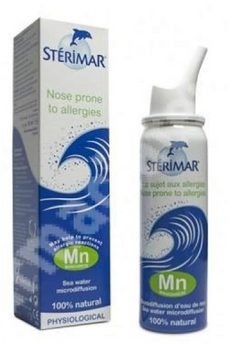Бесплатная доставка для всех заказов свыше €100
Allergy and children

Pollen allergy in children
Pollen allergy is one of the most common forms of allergy in children, and is often treated with allergy medicines to reduce the allergic symptoms. Symptoms of pollen allergy in children can be itching, irritation and a runny nose and eyes.
Allergy medicine for children
If the child has been diagnosed with a pollen allergy and needs treatment, there are many allergy medicines that are suitable and safe for children, and which will alleviate the allergic symptoms. Some allergy medicines will treat the symptoms of allergies, while others will be able to treat the actual cause of the allergy.
Local treatment with eye drops and/or nasal spray against allergies will often be sufficient as treatment.
Read more about eye drops against allergies here, and about nasal sprays against allergies here.
If local treatment does not provide sufficient relief of the allergic symptoms, allergy medicine in the form of tablets, potions or inhalation can be tried. Sometimes injections are also needed against the allergy.
Most allergy medicines can be bought without a prescription at LenaPharm, but for the smallest children it is recommended to see a doctor before treatment, to ensure the correct diagnosis and course of treatment. Ask us at the pharmacy and we will be happy to help you!
What is pollen allergy?
Pollen allergy is an allergy to pollen that is spread by the flowering of various tree, plant and grass species. The body and the body's immune system react to pollen as something foreign, and initiate an allergic reaction upon exposure to the pollen.
Symptoms of allergy to pollen in children
Symptoms of pollen allergy often occur locally in the eyes and nose:
Red, itchy and watery eyes
Swollen and irritated eyes
Congested and/or runny nose
Serial sneezing
In addition, symptoms such as fatigue, poor night's sleep, lack of clarity and reduced ability to concentrate can occur with a pollen allergy.
Allergy or cold?
Many people confuse allergies, especially pollen allergies, with a cold, as many of the symptoms can be the same. A cold usually goes away on its own after a while, so if the symptoms are long-lasting, the child may have a pollen allergy.
Read more about the differences between allergies and colds here.
Allergy and pollen allergy in children
Many children and young people suffer from allergies, as many as 1 in 5 children. Pollen allergy is the most common form of allergy among children.
Pollen allergy (hay fever) in children usually occurs at the age of 2-3, but small children younger than this can also be affected. If the child has atopic eczema as a baby, there is a greater chance that the child will also develop an allergy to pollen.
There are several different forms of pollen allergy, and the most common form of pollen allergy in children is birch pollen.
If you suspect that your child is allergic, it is important to see a doctor to get the correct diagnosis, and to map out exactly what the child is allergic to.
If children have a pollen allergy or other form of allergy and do not receive treatment, the allergy can develop into allergic asthma. Children with allergies have a seven times greater risk of developing asthma later in life.
Good advice for pollen allergies in children
Remember that allergy medicines work preventively, and must be used every day throughout the pollen season, even on days with minor complaints.
Start allergy medicine well in advance of symptoms. The treatment should optimally start 1-2 weeks before the pollen season starts. Watch for a pollen warning near you!
Keep an eye on the weather forecast and a pollen warning, and take precautions - on hot days with lots of wind, for example, there is more pollen in the air than on other days.
Limit outdoor play during periods with a lot of pollen.
Use a pollen net in front of the window in the children's room when airing.
Have your child wear sunglasses outside to limit exposure to the pollen.
Shower and rinse your hair every night.
Wash your hands and face often and after every stay outside.
Always rinse eyes and nose with salt water. Salt water will clean the mucous membranes in the nose and eyes of irritating pollen, as well as give a better effect of allergy nasal spray and eye drops when rinsing before using them.
Change bed linen and especially pillowcases often.
If the child is extra tired from the allergy medicine, it may be worthwhile to take the medicine in the evening, before bedtime.









